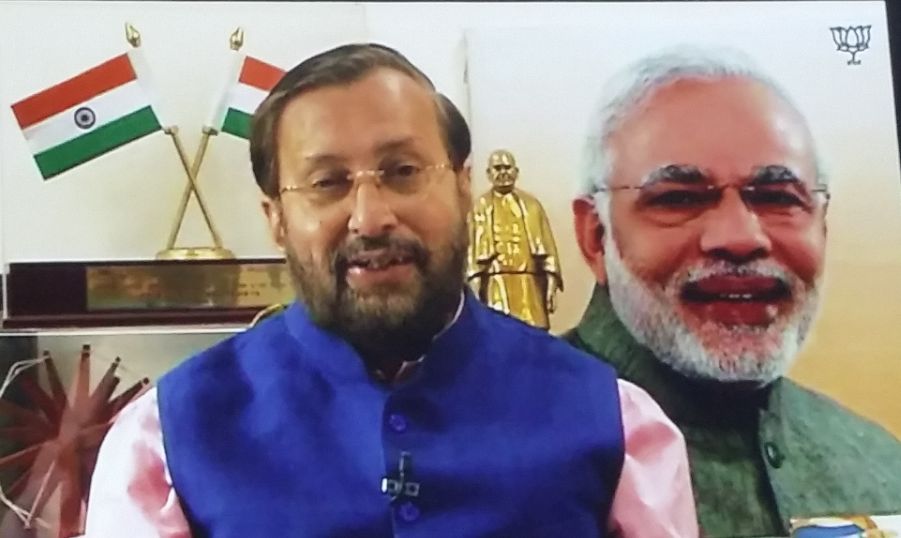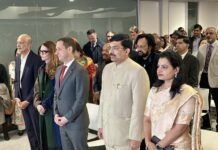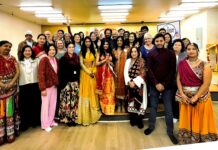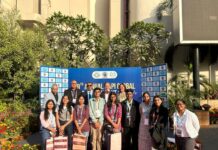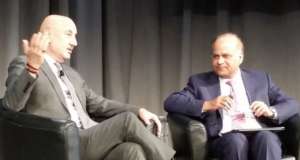 Geetha Patil
Geetha Patil
BOSTON: MIT India Conference 2019 was organized by the MIT India team on Saturday February 16 with many eminent speakers from different fields of life and a large group of audiences that comprised especially students, young professional and startup entrepreneurs.
The theme of the 2019 conference was “India’s Competitive Edge” that aimed at reflecting on what unique factors have allowed India to thrive in science, sports, art, literature, and technology despite fewer resources at its disposal.
In the opening session, the co-chairs addressed the audiences by welcoming and requesting them to observe a 30 second silence for the Indian soldiers who died in the Pulwama terrorist attack on 14th Feb. They also highlighted the objectives and plans of the conference.
Prof Mala Ghosh made her remarks about the MIT India Program and announced awards and honored Professor S.P. Kothari and Vikram Kirloskar for their outstanding contribution to their fields and community. Opening remarks of conference were made by Prof. S. P. Kothari. This episode was followed by his Fireside Chat with Vikram Kirloskar ’81’. Prof. S. P. Kothari received award for his contributions to student community, faculty, and business enterprises and for building strong partnership between India and MIT. He also shared his forthcoming plans for making contributions in his fields of interest.
Preetish Nijhawan’s presentation on the Impact of MIT and India on Entrepreneurship was followed by the fireside chat with Robin Bose. Nijhawan said that Indians dominate the immigrant’s eco-system in Silicon Valley and startup eco-system is thriving in India. India and Indians have a bright future.
For the Session 1: Gearing India for the future through policy and institutions, Dr. Subramanian Swamy joined the session through a video conference and presented his brilliant insight about India’s Economic Positioning in the Global Perspective. He said that India is doing good in many economic, finance, and business areas and suggested some beneficial measures for the government to make rapid progress in these areas.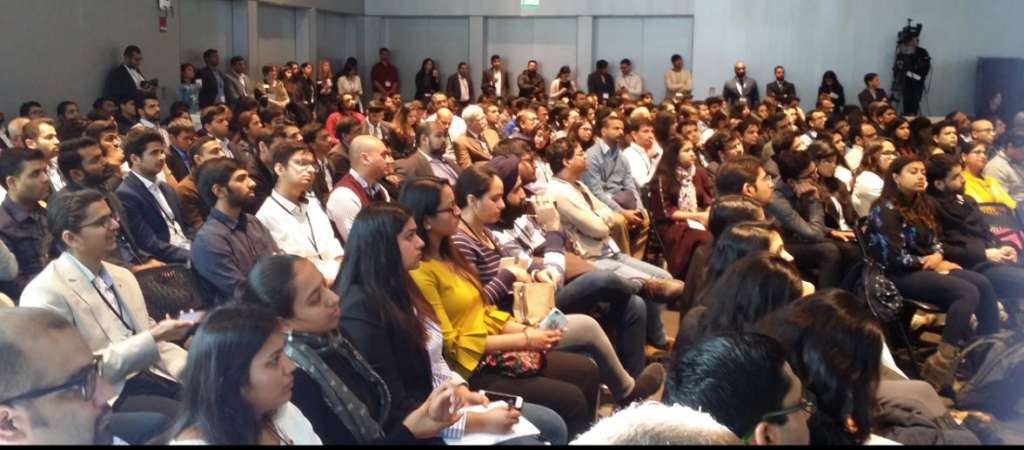
Prof Kothari moderated Q&A and emcee Kritarth Yudhish presented the session on schedule and kept the audience engaged.
Shereen Bhan presented her powerful views on Indian Media: Tussle Between Accountability & Freedom. She said that media should always present its honest stories based on the ground level facts. Emcee Aditi Shankar diligently conducted the session along with the Q&A session of Smt. Bhan as well.
In the Session 2: Business frontiers: opportunities and challenges, two eminent businessmen presented their very interesting talks. Satish Reddy talked about India’s Competitive Edge in the Pharmaceutical Industry. Reddy spoke about how healthcare industry in India is booming through low-cost discoveries and how they deal with FDA rules, prices of generic drugs and other issues.
Sanjay Mehta spoke about Building Sustainable Businesses for a Healthier Planet. He said that he adheres to the values of his company, its relationship with consumers, customers and the Hindustan Unilever’s community-based programs at large. The Fireside chat of this session was moderated by Shereen Bhan. Both speakers answered all the questions of the audiences and the moderator very intelligently and honestly.
After this, in a brief video conference, Anil Kumble talked about his personal experiences on being Time on and off the cricket field. He said that he enjoys not only playing and coaching of cricket but also being an engineer. He wanted to accept the new startup opportunity with Microsoft and succeed in this new endeavor.
Both emcees Neil Gaikwad and Kritarth Yudhish showed their smartness at the deportment of this thought stimulating session. Shweta Aprameya and Raju Goteti’s presentations on Introducing New Scholarship to Support Entrepreneurship for Social Impact and TCS-Co-Innovation Network – India Story respectively were very encouraging for the graduate students who are looking for opportunities for the advancement of their learning and real world experience.
After the lunch break, in the Session 3: STEAM (Science, Tech, Engineering, Arts, Mathematics), Anupam Kher spoke on Evolution of Indian Cinema. What’s Next. He talked about not only about evolution Indian Cinema but also about his own evolution as an actor in the Bollywood and Hollywood industries with his all-time humorous style. He answered the questions of the audiences in a witty and funny manner under Fireside chat with Prof. Kothari.
Arundhati Katju spoke about Strengthening Human Rights: Breaking the Colonial Closet. She talked about various challenges that she faced as an attorney while fighting for the rights of LGBT group in India.
Prof. Priyamvada Natarajan from Yale University presented her very interesting study on Deciphering the Invisible Universe. She talked about cosmology, gravitational lensing and black hole physics. Indrani Medhi Thies spoke on Designing Technologies for Global Social Inclusion. She talked about her primary work at Microsoft Research which has been in the area of User Interfaces for low-literate and novice technology users. She said that her recent work is focusing in the user experience of conversational agents, mainly chatbots.
Fireside chats with Arundhati Katju and Indrani Medhi Thies were carried on by moderator Prof Danielle Wood very diligently. Emcees of the session Aditi Shankar, Neil Gaikwad did commendable work.
The Session 4: Culture and Innovation started with a speech by Manasi Kirloskar on Education in Free India. She talked about the necessity of introducing new approaches in the field education and about her community service which now has been registered as her own non-profit venture “Caring with Color” thus becoming an youngest social entrepreneur.
Ami Shroff spoke about Empowering Women Artisans through Social Entrepreneurship. She is continuing her mother’s organization Shrujan, as a project coordinator in Kutch area and works at the grassroots level and leads the Design Center on Wheels project for the organization, the first of its kind and scale in India.
This was followed by the Fireside Chat of Manasi Kirloskar and Ami Shroff with Prof. Mala Ghosh with very interesting questions and answers. Emcee Aditi Shankar coordinated very well all these talks.
Anil Kumar Gupta talked about Creating Knowledge Networks to Fuel Grassroots Innovations. He talked about how the emergence, recognition, and diffusion of grassroot innovations help trigger experimental self-design ethic and reduce dependence on the government for solving local problems. He also said that creating hotspots for machinery inventions are not the same in every field of life.
D. R. Mehta’s presentation on Affordable Healthcare: Role of Entrepreneurship and Technology created very genuine curiosity about his projects and self-less volunteer work. He set up Bhagwan Mahaveer Viklang Sahayata Samiti (BMVSS) in Jaipur in 1975 and it has emerged as the largest organization for the handicapped in the world, providing artificial limbs/calipers and other aids and appliances for free.
More than 1 million people have been its beneficiaries so far. He also talked about its projects with MIT and Stanford University. This episode was followed by Fireside Chats with Anil Kumar Gupta and D.R. Mehta which was moderated by Pooja Wagh. She asked very intriguing questions to know more about their works and impending plans for the enhancement of their services.
Emcee Kritarth Yudhish harmonized the session very well with all the speakers. Prof. Urmi Samadar, Director of Action Learning, MIT Sloan School of Management, moderated the Fireside chat with Farhan Akhtar by asking her own questions along with audiences’ questions about his initial career, roles, and movies and awaiting plans.
Lastly, a short-pre-recorded video message of Prakash Javadekar, the current government’s Union Minister of Ministry of Human Resource Development (MHRD), was shown to the audiences. In his message he talked of many government policies that are going to help to shape his ministry’s schemes and projects.
In the closing session, the co-chairs of the conference thanked everyone in the audience for attending this event and making it a grand success. Gaikwad proposed his heartfelt thanks to all the sponsors, co-chairs, vice presidents, conference finance, marketing, operation, outreach team members, and advisors for their support, help, and dedication. He also thanked MIT Media Lab for proving them the well-equipped venue.
The MIT India team consisted of India lead Chairs, namely Aditi Shankar, Neil S. Gaikwad, Kritarth Yudhish and lead vice presidents, specifically Amit Kumar, Anchal Goyal, Anupam Jena and many others. Melanie Mala Ghosh, Managing Director, MIT-India & MIT-South Asia, and Prof. S.P. Kothari, the Gordon Y Billard Professor of Accounting and Finance, MIT Sloan School of Management were the advisors of the conference.

